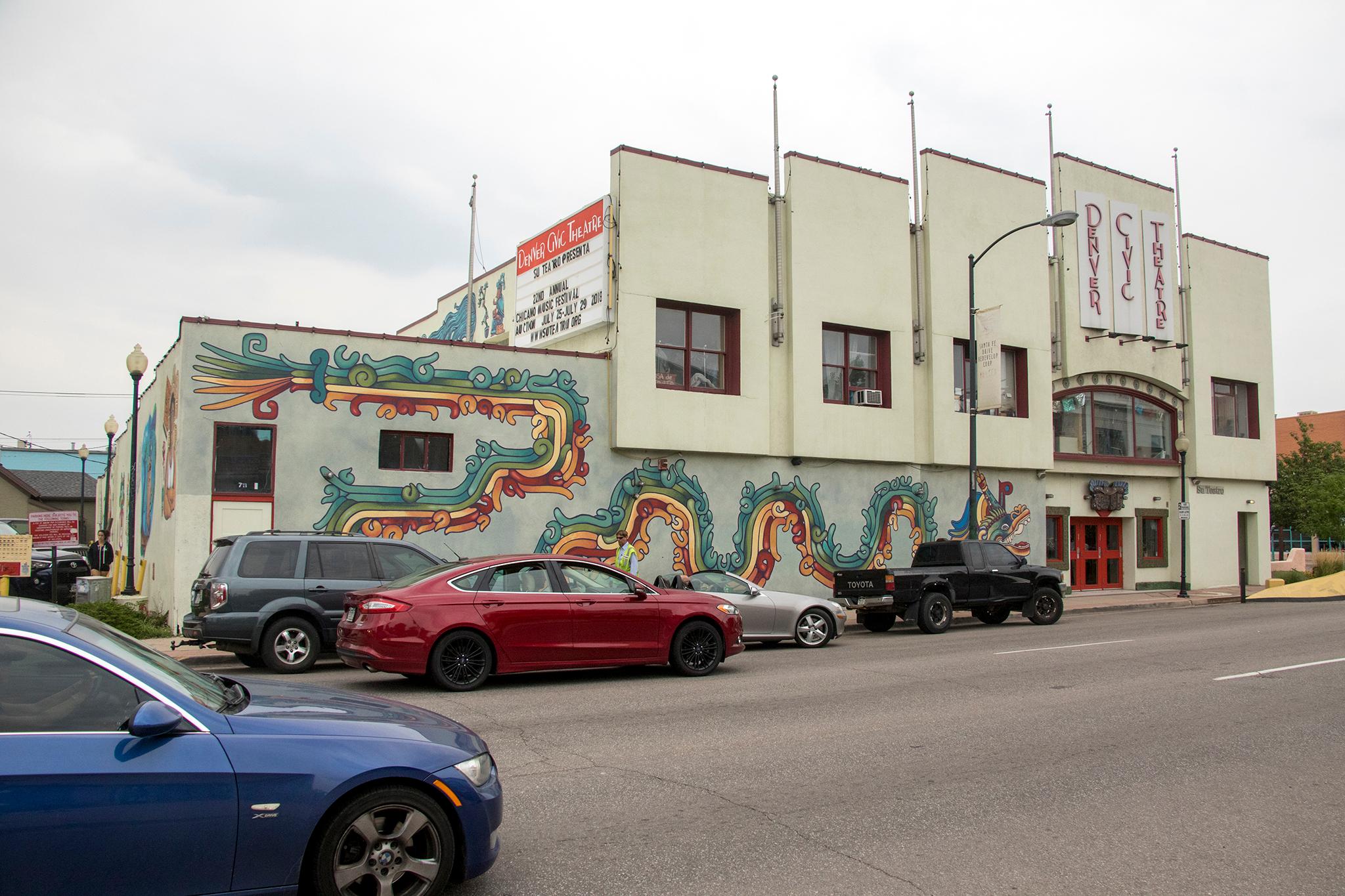In 2019, Su Teatro put on a play called War of the Flowers. It followed the story of the 1968-1969 Kitayama Carnation Strike in Brighton, staged by workers who were protesting poor working conditions and harassment at the Kitayama Carnation plant.
As part of the strike, five women chained themselves to the gate of the plant. Weld County sheriffs deputies showed up with tear gas and approached the women who, chained in place, were unable to run from the scene.
"They brought them up point blank to the women and just doused the women in this tear gas," said Su Teatro executive artistic director Tony Garcia.
During the show's pre-production stage, the theatre company reached out to one of the women who'd been involved in the strike.
"She said, I don't want to talk about it. That's the most horrible day of my life. I felt that was the biggest failure of my life. And I don't want to revisit it," Garcia said.
Garcia said she changed her mind and eventually consulted the company. After the show opened, Garcia said, she wrote him a letter about her experiences during the strike and what it meant to see the play.
"She said, When I saw the show, and I saw the young people in the show, and I realized that we hadn't lost. I realized that, in fact, we won," Garcia said.
That same year, Su Teatro produced another show based in local history. Called Fire in the Streets, the play tackled the 1969 West High Blowouts, when about 150 West High School School students walked out of the school in protest of racism and the mistreatment of Chicano students, only to be met with police violence, tear gas and arrests.
At one point in the play, Su Teatro used fog machines to fill the theater with "smoke," simulating what the streets looked like during the Blowouts.
"We actually had people coming in, talking to us and going, I'm having a really tough time. I'm just going right back to that place when this happened to me," Garcia said. "One night, we had to call in the EMTs because a woman was just going, I'm just feeling weak, it's just taking me back to this thing, and I haven't dealt with it."
Su Teatro is a community-driven theatre group with a long legacy of producing impactful original shows that engage with Chicano history and experience.
Some of these shows deal with traumatic events, including ones that are still fresh for many of the community members in attendance. In the last couple of years, in response to conversations they've had with audience members, Su Teatro started to think more deeply about the larger implications of telling stories about traumatic historic events that have impacted community members who're still alive.
"It made us start thinking about the role of trauma as it's portrayed in theater and in stories," Garcia said. "We see so many things where these horrible things happen. And then we don't think twice about it, of what we might be unleashing in it."
Garcia gave the example of Romeo and Juliet, a play about two young people who both end up dying by suicide. He said that the story is regularly taught in schools to teens, a demographic that sees high rates of suicide. Often, Garcia said, we tell stories without considering the impact the story might have on its audience. Once the credits roll, or after the curtain falls, everyone walks out of the theatre as if nothing had happened.
"And that's clearly not true," Garcia said.
"What could be the role of the arts, and plays, and music and all this, as a healing process?" he said. "Of understanding that these issues are there, and not just look at creating these whole terrible, traumatic experiences without any kind of responsibility or understanding that these could trigger these repressed feelings that people are having?"
Those conversations led to a new project at Su Teatro called Drama vs. Trauma. It's a three-year mental health and arts program designed to engage Latino and Chicano community members in conversations about Su Teatro's plays and how the stories play into their own trauma.
Each Su Teatro production will include gatherings with community members from different target groups, depending on the show's subject matter. The company invites about 30 participants to come together for a two-part conversation - a story circle before the show premieres, and open community talks after the show.
At the pre-show gatherings, participants meet for script readings. The sessions are guided by mental health workers like Ramon Del Castillo, an educator, poet and mental health expert who previously was the head of MSU Denver's Chicano Studies Department, and folks from Servicios de la Raza, who're embedded in the community and knowledgeable about the issues covered in Drama vs. Trauma.
Garcia said these conversations aren't designed as theatre workshops. They don't necessarily lead to major rewrites of the script. But they do give deeper insight into the work Su Teatro is doing, which in turn influences the production in subtle ways.
"You start to see things in the piece that you may not have seen before, and it takes you down a certain road," he said. "It just kind of tilts your perspective, and it brings realization to certain things, that there's more depth there."
After each play opens, Drama vs. Trauma holds open post-show talks led by trauma-informed coaches.
"There is a big difference between when (participants) read the play together and they discuss it, and after they see it. Because it becomes more three dimensional," Garcia said. "They actually see it coming into fruition, and it comes differently than their expectations."
He said the discussions can sometimes get very emotional.
"I don't remember one where there weren't people crying," Garcia said. "Sometimes people are crying just because it's just overwhelming, what they're feeling, not necessarily because they're sad, and they're beat up."
The hope for the project is to more consciously share stories and give community members more agency over them. Now, Garcia said, audience members have a safe forum through which to explore their feelings about a show, under the guidance of mental health professionals who have some cultural context for the stories that might emerge during the gatherings.
"I think we live in a world a lot of times where we don't want to talk about stuff that's happening to us," Garcia said. "We've been taught to just kind of keep stuff to ourselves, and that's the best way to deal with it. And from the partners that we've been bringing in, it's like, no, you need to go into those dark places at times. And this is one way of exploring this."
Garcia emphasized that the gatherings are not therapy sessions. While there will be mental health experts present, the purpose of Drama vs. Trauma isn't to treat people. It's to provide space for dialogue before and after a play is put on.
"This is not a clinical analysis," he said. "We're artists. What we know how to do is art. I think it provides safety for our participants, because we're very clear: We're not in a position to heal anybody. We're only going to be able to have a conversation"
The program is still young, but Garcia said it's been well received by the community so far. Su Teatro is now staging their second show to include Drama vs. Trauma conversations.
He said the program will likely continue to grow, as Su Teatro grows into the needs of their community.
"In our 50th year, we've grown to a place where we have enough respect and stability in our community that we can start to offer a variety of services," he said. "And the demand for what we're doing has grown. And now we're working as hard as we can to meet that."
Their latest show, Chicanos Sing the Blues, premiered June 9. It tells the story of a blues musician about to begin treatment for cancer. It's a reflection on life and loss, and uses music and comedy to explore ideas about terminal illness, health disparities, caretaking of elders and grief. For this production, Su Teatro has been working with a group of older community members for whom these topics might particularly resonate.
Garcia said the show itself explores the relationship between art and trauma. In the story, the main character tries to make a deal with the African and Caribbean deity Elegua, who represents a crossroads. The protagonist wants to be able to return to moments in his past when he was surrounded by music and his old bandmates, and to remember what that felt like. The story draws connections between Black and brown communities through shared experiences with music, and how blues songs often emerged from traumatic experiences.
"If you listen to our music, they have a lot of that same kind of focus, of taking something tragic and deep, digging into it, and finding solace in it," Garcia said. "We go, Oh, God, it's so beautiful, that pain is so beautiful, mourning is so beautiful. But the reasons we do it a lot of times, is because there's a healing aspect in it."
Chicanos Sing the Blues runs at Su Teatro from June 9-26. Tickets are available online.













